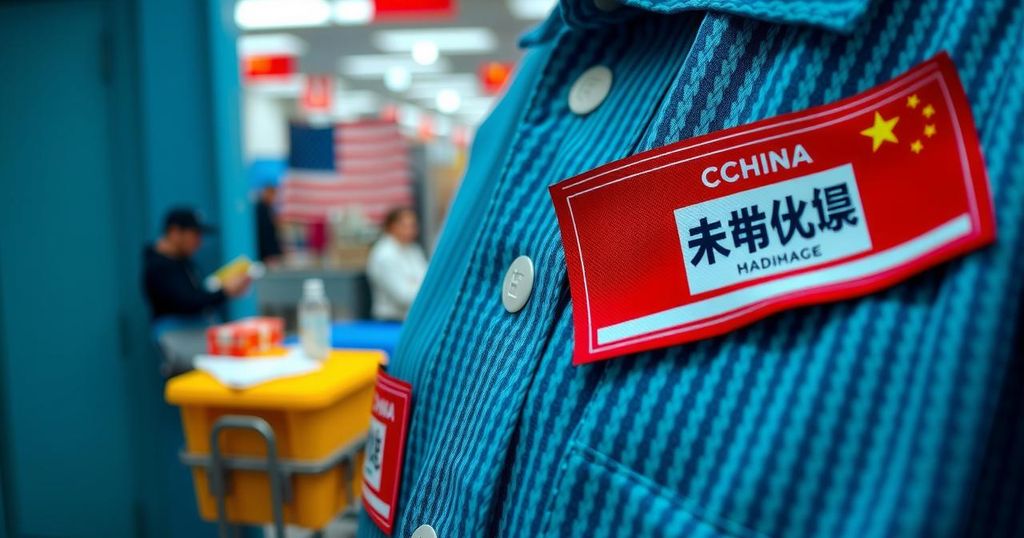As the 2024 U.S. presidential election nears, a significant amount of election merchandise, including prominent campaign items such as hats and T-shirts, is being imported from China at dramatically lower prices than American-made alternatives. This trend raises concerns for domestic manufacturers struggling to compete, especially in light of loopholes in U.S. trade policy. The situation also presents a contradiction for voters committed to supporting candidates advocating for economic reform and domestic manufacturing, as many are unknowingly purchasing goods that undermine these very principles.
As the United States presidential election approaches its climax, voters increasingly showcase their candidate preference through various forms of election merchandise. However, many may be unaware that the items they purchase, such as the iconic “Make America Great Again” Trump hats or the satirical “Childless Cat Lady for Harris” T-shirts, are likely produced in China. With the aid of e-commerce platforms, there is a notable influx of affordable goods from Chinese suppliers saturating the U.S. election merchandise market, which has made it challenging for domestic manufacturers to remain competitive. Ben Waxman, the founder of American Roots—an American clothing company—expressed significant concern, stating, “I think the amount of stuff on Amazon and Etsy that’s coming from China and other countries in cargo ships and unloaded on American shores is drastically impacting American manufacturers’ ability to compete and grow our own business. I think it’s dramatic.” Waxman further revealed that while his U.S.-produced campaign T-shirts retail for approximately $15, equivalent items available through platforms like Temu can be priced as low as $3. He attributed this price difference to higher labor costs and adherence to environmental regulations in the U.S. Data regarding total sales of American-made election merchandise versus those made in China is elusive, but observable evidence indicates a flood of cheaper options on online marketplaces such as Amazon and eBay. On Temu, thousands of election-themed products are available at vastly reduced prices; for instance, a “Make America Great Again” hat can be found for less than $4, while the official Trump campaign’s versions are priced at $40. Similarly, Temu offers “Kamala Harris 2024” hats for under $3, compared to the $47 price on the official campaign store. This stark price disparity underscores the challenges the U.S. faces in curbing its reliance on Chinese imports and addresses loopholes like the de minimis threshold, which allows for tax-free imports of goods valued under $800. Kim Glas of the National Council of Textile Organizations highlighted a troubling trend, noting that her organization has lost 21 manufacturing operations in the past 18 months due to such loopholes. Despite the influx of low-cost products, U.S. textile industry representatives view the contradiction in presidential candidates advocating for stricter trade practices while their supporters buy inferior, foreign-made goods. Mitch Cahn of Unionwear pointedly remarked: “If someone is supporting a candidate because of that candidate’s economic policy and their position toward improving our economy… and then they’re supporting a candidate by buying a product that’s made in a country that stands for the opposite… they’re actually doing themselves and the candidate and the economy a disservice.” In light of this situation, concerns also arise regarding the production of campaign materials without intellectual property oversight, which allows for a plethora of manufacturers, often overseas, to produce campaign merchandise en masse. Additional reporting revealed that many promotional items, including thousands of Donald Trump’s “God Bless America” Bibles, have their origins in China, leading critics to suggest that Trump’s promotion of American-made goods is somewhat undermined by these revelations. Marc Zdanow, a political consultant, articulated a sense of disillusionment, contemplating, “In past [election] years, this would’ve been a scandal. I think Trump voters just don’t care.” Experts such as Chris Tang of UCLA underscore that while job losses in manufacturing are indeed profound, they also allow for small businesses to thrive by utilizing online platforms to quickly import election-related merchandise. He advocated for a shift toward the U.S. manufacturing sector prioritizing high-value products rather than competing in the low-cost election merchandise arena.
The article addresses the rising phenomenon of election merchandise sourced from China reaching American consumers amid the U.S. presidential election. It highlights concerns from American manufacturers struggling against the competitive pricing of Chinese-made goods. The observations reflect broader issues surrounding U.S. trade policies and the impact of inexpensive imports on domestic production and employment. Insights from industry experts detail the implications of this trend on the local economy, emphasizing the complexities of consumer behavior in relation to political allegiance.
In conclusion, the influx of Chinese-made election merchandise presents a significant challenge to American manufacturers in the context of rising campaign politics. While consumers benefit from lower prices, the long-term implications for U.S. manufacturing and the economy are profound, raising critical questions about the effects of foreign competition on domestic industries. The disconnect between voters’ expressed political values and their purchasing decisions exemplifies the complexities of modern consumerism and economic policy.
Original Source: www.voanews.com







